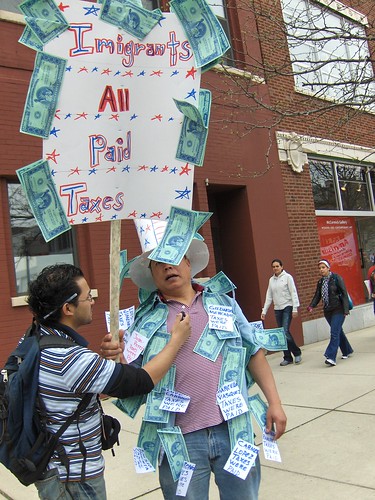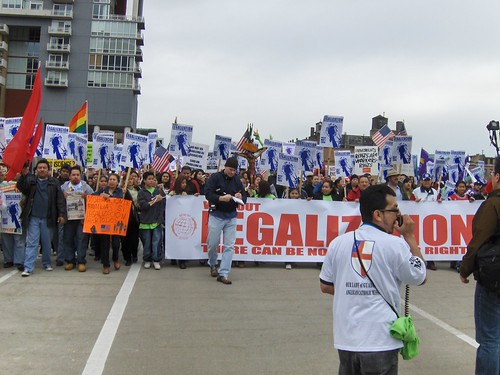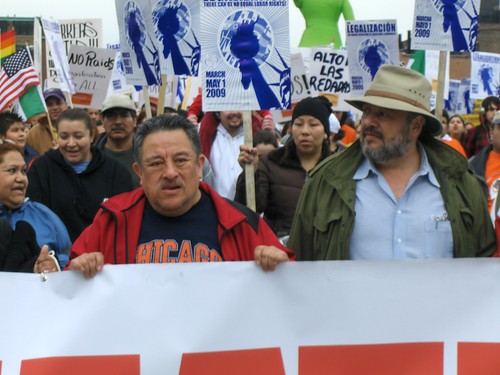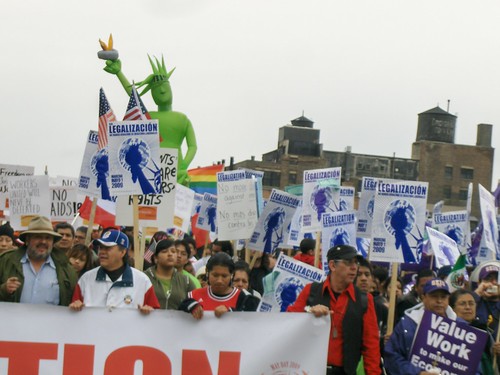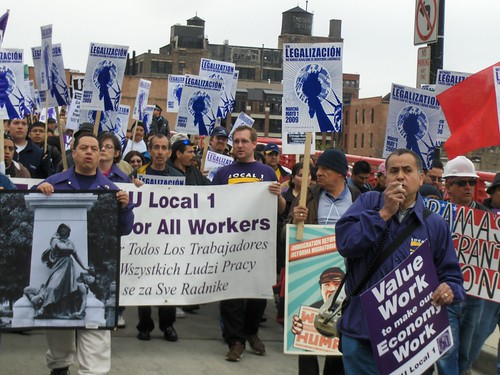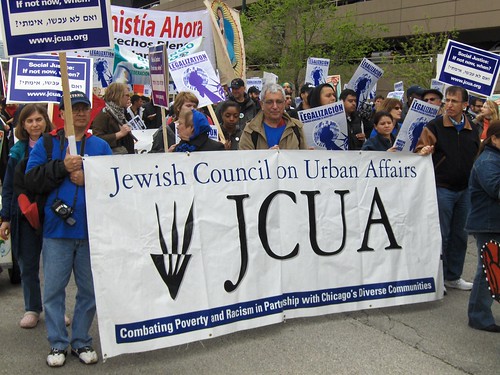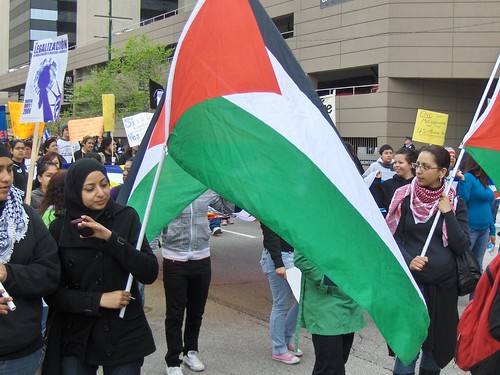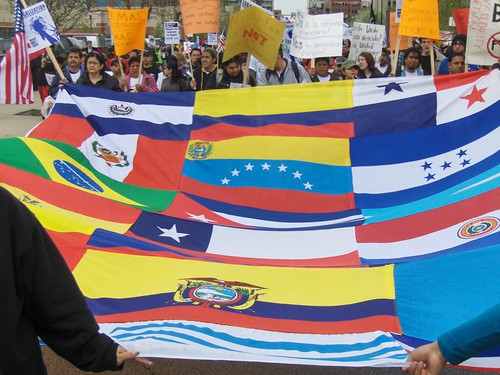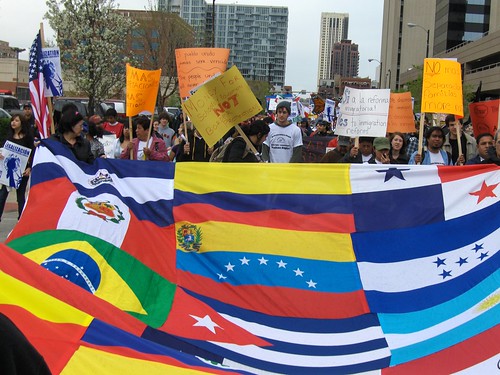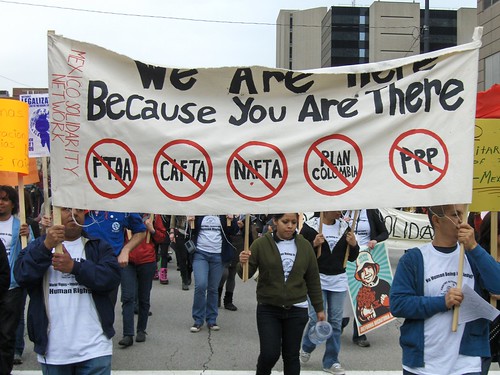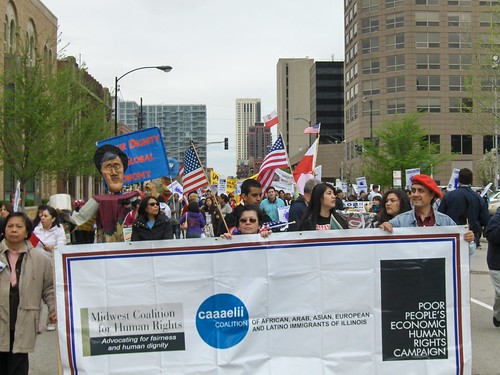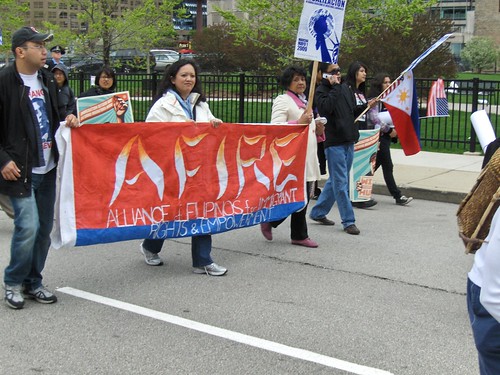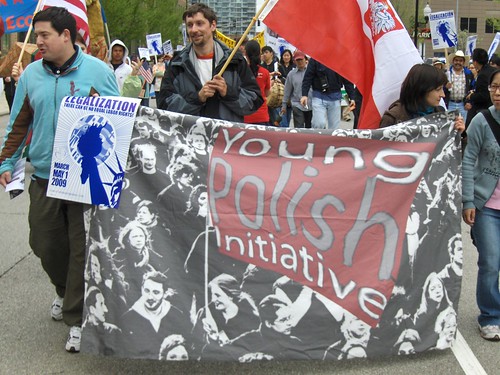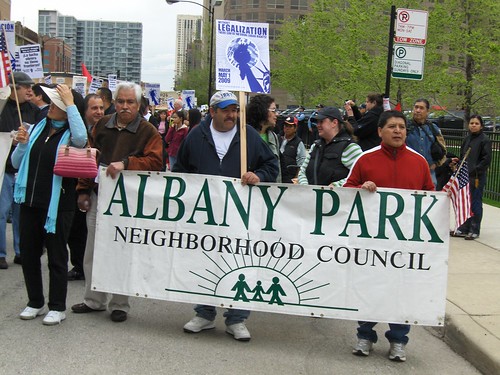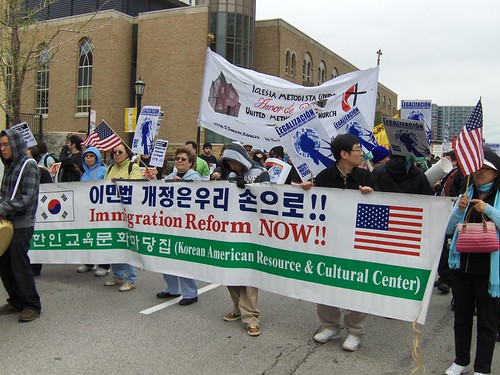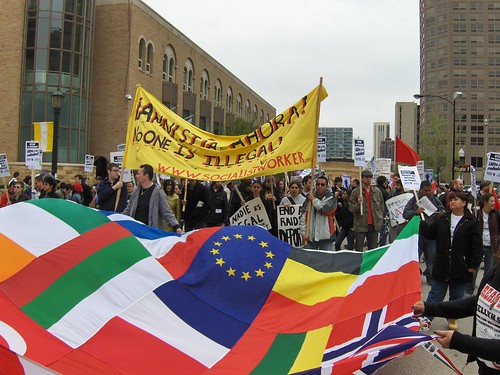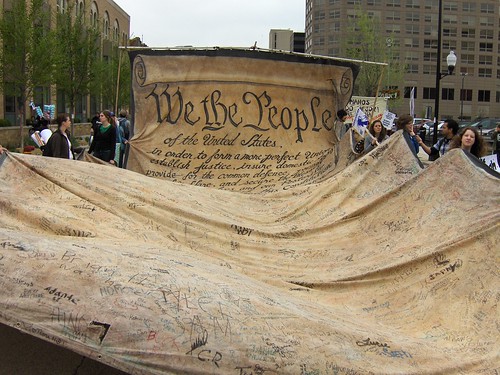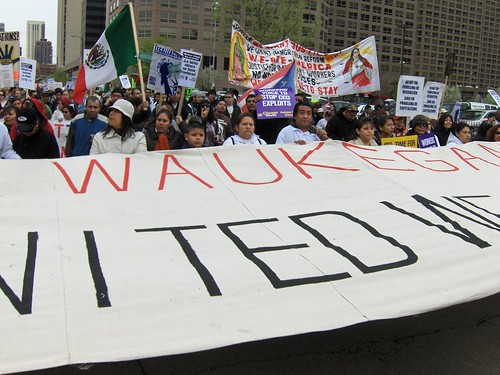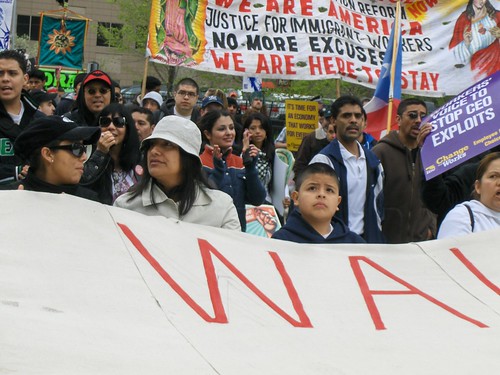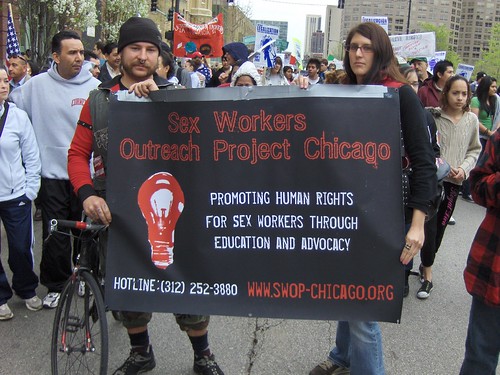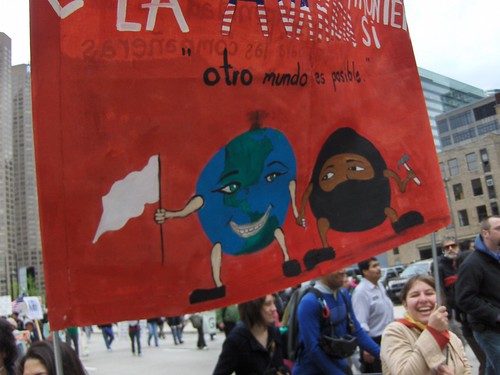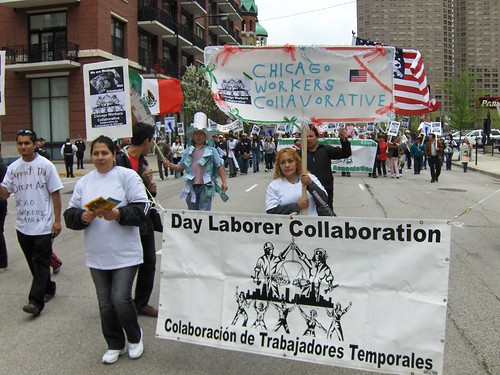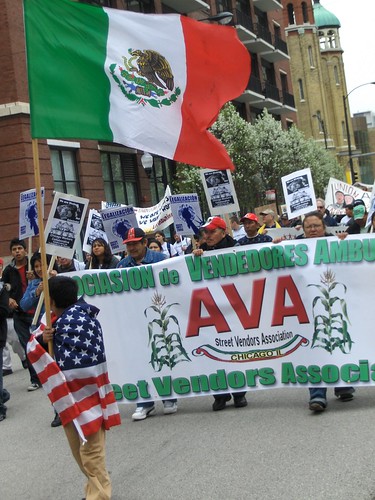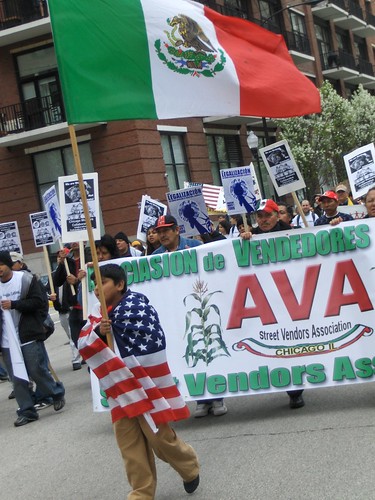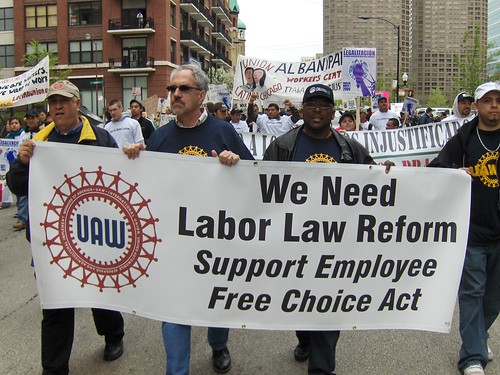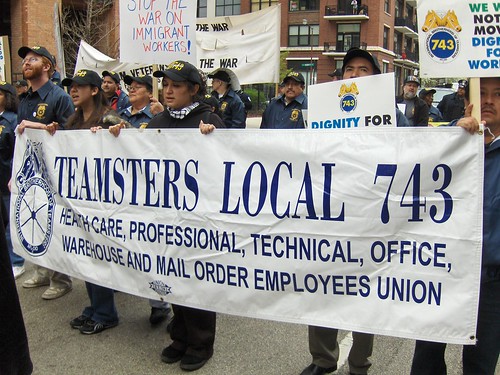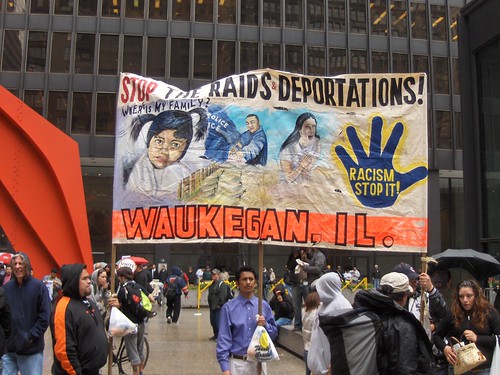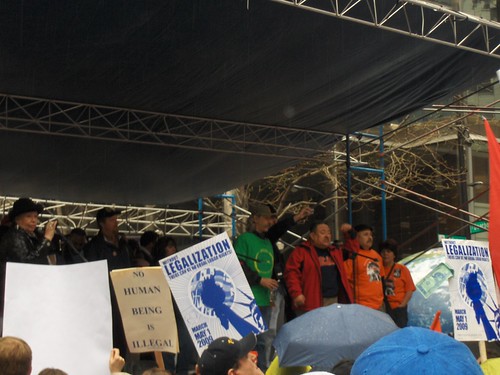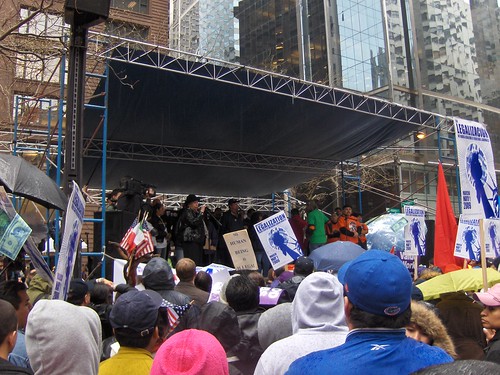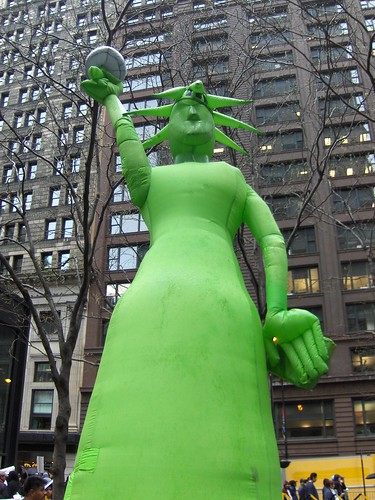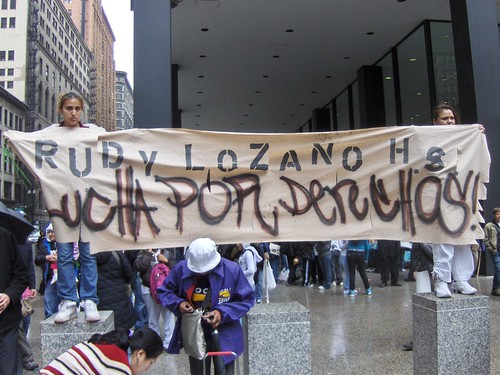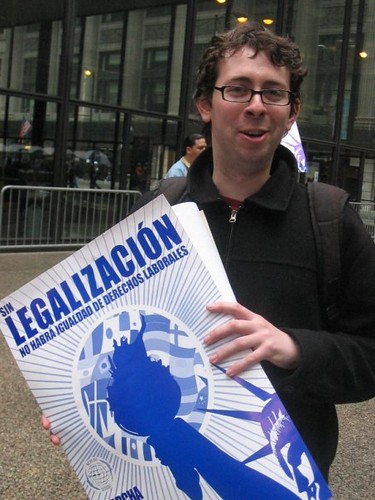Despite the economic recession, Hollywood movies are having great financial success. The article Moviegoers Flood Theaters by Erika Brekke and Meg Martin addresses this seeming contradiction in the April 9, 2009 issue of Skyline, a local Chicago paper that covers the yuppie infested neighborhoods of Lincoln Park, Old Town, River North and the Gold Coast. The article essentially promotes escaping into the movies. It encourages people to forget their economic hardships and drink Hollywood's kool-aid. Movies “regulate the body during times of stress,” and “fill a hole in the American psyche,” by “offering everything from catharsis to escape.” also “moviegoers subconsciously associate on-screen actors as part of their own social network.”
I feel that this kind of thinking is why a movie like Slumdog Millionaire won the Academy Award for best picture. Everybody loves an underdog who beats the odds and becomes a success. This movie was not only about such an underdog, an Indian boy raised in the slums who is able to win a tv game show, but the movie itself was an underdog. Slumdog Millionaire was shot on a shoestring budget and was intended to go straight to video, but instead swept the Academy Awards. Many spoke about the movie as though it were the perfect movie for the economic recession. It was a feel good Horatio Alger story, where a hard working smart kid is able to pull himself up by his bootstraps and take advantage of opportunities. I felt that the movie depicted the poverty and crime of Indian slums well, and it's great that the movie has directed attention to the poverty in the third world. However I vehemently disagree with the movies promotion of the Horatio Alger myth in this time of economic crisis. Ultimately Slumdog Millionaire was a movie about one man making himself rich the legal way, while the millions who continue to live in the slums have to be satisfied with living vicariously through the slumdog millionaires success. I think it's also despicable that the children who starred in the film have yet to see the financial success of the movie translate into their own lives. According to a recent Dateline NBC episode, the children are still living in slums.
Which is why I feel like Milk, the bio-epic about the first openly gay elected politician, San Francisco's Harvey Milk, should have won the best picture nod. While I was happy with Sean Penn and Dustin Lance Black's Oscar night wins, and their fantastic acceptance speeches, I feel like Milk suited the times much better than Slumdog Millionaire. Ultimately Milk was about building a mass movement. It was a movie about Harvey Milk, but it was also a movie about mass popular struggle. It's hard not to tear up when, after Harvey Milk is assassinated, his friends wonder where everyone is, if Milk had died in vain, but then they leave the state sponsored funeral to see a large candlelight procession working it's way through San Francisco's streets. It was a movie about building gay community and opposing homophobic assaults. It was also a movie about the working class. I think it says something that after Milk created a gay business association, his first political alliance was when the Teamsters came to him, and asked for his support in boycotting Coors beer, which he agreed to with little convincing.
I haven't seen part 2 yet, but Che part 1, featuring Benecio del Toro as the Argentine Communist who fought besides Fidel Castro to liberate Cuba from the dictator Batista in the 1950's, is fantastic. It almost seems like Toro is Che. The movie starts slow and builds. They skipped some of the more obvious parts of the legend of Che. They choose to skip the disastrous landing at Cuba, where only 12 of the 50 revolutionaries survived the attacks by Batista's forces, where Che was forced to decided what he would grab, his medical box or a rifle, and he grabbed a rifle. Instead the movie starts in the the jungles and mountains of Cuba, as Che slowly builds a guerrilla army. One of the things I liked about this movie was that they didn't depict Che as some hero, but instead he's a hard ass. He has high expectations of his soldiers, and scolds them multiple times throughout the film. There is plenty of action in this movie, but none of it is melo-dramatic. One of my favorite parts is when a lieutenant for Batista's forces refuses to surrender to the Guerrilla's, so the Guerrilla walks into the church where Batista's men are holed up and tells them that if they surrender, the rebels will take care of them, but their leader wants them to continue to fight and die. The soldiers agree to not fight the rebels. I also enjoyed the final scene. Che received word that Batista had fled the country and the revolution was victorious, Che responds that the revolution had just begun. Che is driving down a road in a convoy of rebel army jeeps toward Havana for a victory parade, when a bright red convertible speeds past him with two rebel army officers inside. Che swears, speeds up his jeep, until he catches up with the convertible, and orders them to pull over. Che then asks them where they got the car, they had stolen it from a Batista supporter, Che tells them to turn around and take it back and tot ride to Havana in a jeep. They were not allowed to steal property.
While we're on the subject of violent icons, we should mention the Punisher:War Zone movie. While Che was about a man who inspired people to join the fight for their own liberation, Punisher is about one man's psychotic desire for revenge. The movie features former Cop and army veteran Frank Castle seeking revenge for the mafia killing his family. We witness the Punisher killing pickpockets, shooting an entire army of gang members, and basically showing little faith in humanity. The Punisher:War Zone movie has it's highlights. It captures the nihilistic bent of the character in ways that neither of the two previous Punisher movies came close to. Also I enjoyed the way the major villain of the movie, Jigsaw, is compared to Uncle Sam's army recruiting. When Jigsaw explains his plan to mobilize gangs to fight the Punisher, Jigsaw's henchman asks him how he'll get them to fight. Jigsaw replies that just like Uncle Sam, he'll promise them lots of money that they'll never make, and promise them a college education they'll never get.
As a liberal on crime issues, I have to say that most of these gang members are only gang members because of the poverty they find themselves in. Also the death sentence is a little harsh for people who likely could have been rehabilitated. Also, who is the Punisher to determine who lives and who dies? While I'm not the biggest fan of the police, at least they have democratic checks on their power. There are community run police review boards. Then in the courts judges are elected or appointed by elected officials. The laws the police enforce are made by democratically elected legislators. The Punisher doesn't have any of that. He's just a vigilante, a thug, a fascist brown-shirt with giant guns. I worry about the people who identify with the Punisher as part of the unconscious social network.
Speaking of vigilante movies, few have captured the public imagination the same way The Dark Knight has. There is a lot to like in this movie. Director Christopher Nolan played it not as a comic book movie, but as a serious crime drama. Christopher Bale as Bruce Wayne and Batman is good and Gary Oldman is great as Police Commissioner Gordon. Heath Ledger's Academy Award winning performance as the Joker is fantastic. I feel that Ledger, who died shortly after the film finished, deserved the Academy Award as recognition for his role in the gay rights classic cowboy movie Brokeback Mountain.
The action scenes in Dark Knight are amazing. What made this movie popular among critics though, was the fact that it was an adult movie, dealing with adult issues. There was no cheesy comic book moralizing, instead there was agonizing on what the right thing to do was. Also this was a movie that casts aside the traditional Hollywood movie script. There was no origin story of either the main protagonist Batman or his antagonist, the Joker. There was no sex scene, which is popular in such summer action movies. Instead we have a 2 and a half hour action ride that does not let up for a second.
With that said, what are the politics of the movie like? Depressingly conservative propaganda. I almost don't know where to start. Do I point out the torture techniques that Batman uses to extract 'ticking time bomb' information from the Joker as though Batman were a guard at Abu Ghraib? What about faithful servant Alfred's memories of burning down jungles in Burma? Or what about the police department's collaboration with an outlaw vigilante ala the Colombian army's collaboration with the the terrorist right-wing anti-union paramilitary forces? What about the cell phone spy network that Batman creates allowing him to spy on every Gotham City citizen without a warrant as though he were George Bush. (Many people say that he only used it to find the Joker. Well, if you believe that then you must believe that George W. Bush only spied on terrorists and Al Qaida members). There were also Anti-Asian stereotypes and representations in both the Dark Knight and its prequel Batman Begins.
What about the billions of dollars that trust fund baby Bruce Wayne spends on the Bat-Tank just so he can beat up pick pockets and people who are in need of a psychiatrist. Maybe that money would be better spent on a hospital, a school or union run factory's? Or maybe we should talk about the ending, where Batman and Police Commissioner Gordon act as Plato's Philosopher-Kings who create a myth for the people to believe about Harvey Dent, so that “their faith can be rewarded.”
One of the items that frustrated me was the Joker's anarchy speech. He explains that he's seen as a bad guy because he doesn't have a plan. Nobody would freak out if he announced that a platoon of soldiers would die, or that a gang banger was going to be shot, because it's part of the plan. But when the Joker announces that he is going to target the Mayor or a district attorney, everybody goes crazy. Not a bad line, but the Joker becomes a classic misrepresentation of Anarchist goals and ideals. The Joker is a creature of chaos, and he spends the entire movie trying to cultivate a city that is pitted against each other in devious games. Instead of waging a class struggle against the rich who exploit the labor of poverty stricken Gotham City residents, the Joker spreads mass panic. Many critics praised the Joker character for perfectly capturing the fear of irrational terrorism striking at civilians. What I feel this represents is American's failure to understand the reasons and rationalizations of those who attack America today.
The people of Gotham City are able to redeem themselves for a moment, when they decide to not blow each other up in one of the Joker's diabolical schemes involving bombs on boats. However, Bruce Wayne's struggles with his role as Batman, hoping to inspire people to legally and democratically challenge the mob, and while Batman is more morally responsible than the Punisher in that he does not kill, he ultimately only inspires gun toting Batman copycats, criminal psychopaths like the Joker and finds himself locked in a situation where “the day may never come where [Bruce Wayne] does not need the Batman.”
What is the role that movies are playing in the recession? Unfortunately, escape into the spectacle. What is the Spectacle? We should turn to Guy Debord, and his classic post-modern anarchist manifesto, “The Society of the Spectacle.
“In societies where modern conditions of production prevail, all of life presents itself as an immense accumulation of spectacles. Everything that was directly lived has moved away into a representation.” What Debord is saying here is that in advanced capitalist countries, corporate mass media has taken a dominate role in how we perceive the world.
“The spectacle is not a collection of images, but a social relation among people, mediated by images.” What he means here is that the Spectacle is not the movie, but the production and consumption of the movie or other mass media.
“The spectacle is the existing order's uninterrupted discourse about itself, its laudatory monologue. It is the self-portrait of power in the epoch of totalitarian management of the conditions of existence. The fetishistic, purely objective appearance of spectacular relations conceals the fact that they are relations among men and classes.” Debord is saying that the process of creating and disseminating mass media is sort of an ideological propaganda tool, a way for the capitalist system to create and perpetuate it's own myths. The Spectacle is essentially about one class (the bourgeoisie) dominating another (the proletariat).
“Alienated consumption becomes for the masses a duty supplementary to alienated production.” For the working class, Spectacular things are what they do when they are not at work. They drink, watch movies, read dime store trash novels, to mentally escape from their real world hell. There is no liberation in escaping into fantasy.
So how do we struggle against the Spectacle? “To effectively destroy the Society of the Spectacle, what is needed is men putting a practical force into action.” It can not be struggled with in fantasy. It must be struggled with in the real world.
“Emancipation from the material bases of inverted truth – this is what the self-emancipation of our epoch consists of.” The ideology spread in corporate mass media is an inverted truth, and it has a material basis in class oppression. It should be our goal to liberate ourself from class oppression in order to end the Spectacle.
“This 'historical mission of installing truth in the world' cannot be accomplished either by the isolated individual, or by the atomized crowd subjected to manipulation, but now as ever by the class which is able to effect the dissolution of all classes by bringing all power into the dealienating form of realized democracy, the Council, in which practical theory controls itself and sees its own action. This is possible only where individuals are 'directly linked to universal history'; where dialogue arms itself to make its own conditions victorious.”
Through class struggle, by uniting the working class into unions and fighting for control of the means of production, a classless society will begin to take birth, and a media which engages people will come into existence. Media which tells the truth about material conditions, media which is made, disseminated and engaged with democratically. Instead of art and media which are products to be consumed on a market, we would have an ongoing dialogue among peers in multiple mediums.
As Marx said, "The demand to give up illusions about the existing state of affairs is the demand to give up a state of affairs which needs illusions."

